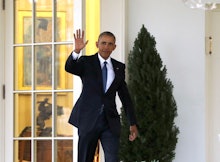Obama aides left a trail of intelligence about possible Russian election hack

In an effort to preserve the information, Obama administration officials spread a trail of intelligence across the government regarding Russia's interference with the presidential election and possible communications with Donald Trump's campaign team, the New York Times reported Wednesday.
Noting deep concerns among President Barack Obama's aides that the incoming Trump administration would expose the sources of the intelligence information or would attempt to cover up or destroy it once Trump took office, aides reportedly worked into the final hours of Obama's presidency to spread and preserve as much intelligence as possible.
Officials reportedly employed a number of strategies to spread and preserve their findings. Officials who spoke with the Times said they made sure to ask specific questions during intelligence briefings because they knew the answers would be archived, pushed as much "raw intelligence" as possible into analyses and ensured the information was kept at a "relatively low classification level" so it could be read by as many people as possible. The push to convert raw intelligence into official analyses also allowed for the information to be uploaded onto a "secret wiki" called Intellipedia that is used by American analysts to share information, the New York Times reported.
The paper also reported that officials attempted to hand reports and sensitive information to Congress, noting:
In one instance, the State Department sent a cache of documents marked "secret" to Sen. Benjamin Cardin of Maryland days before the Jan. 20 inauguration. The documents, detailing Russian efforts to intervene in elections worldwide, were sent in response to a request from Mr. Cardin, the top Democrat on the Foreign Relations Committee, and were shared with Republicans on the panel.
The New York Times reported that these actions were not directed by President Barack Obama. Instead, the moves were carried out by administration officials who became increasingly convinced that the information was "damning" and who became concerned by statements Trump made as Inauguration Day loomed near. The actions taken to preserve the information speaks to the deep suspicions among administration officials regarding Trump's possible collusion with Russia to hack the Democratic National Committee and sway the election in his favor. Officials who spoke with the New York Times said those concerns have not yet been confirmed.
In January, the Senate Intelligence Committee announced an investigation into Russia's efforts to sway the election. In mid-February, the Wall Street Journal reported that intelligence officials and spies were keeping highly sensitive information from Trump for fear that he would leak it. At the time, a White House official and a spokesman for the office of the director of national intelligence told the Wall Street Journal that these allegations were false. On Tuesday, White House lawyers instructed Trump's staff to preserve intelligence related to Russia's interference with the 2016 election and other relevant investigations, the Associated Press reported.
White House press secretary Sean Spicer told the New York Times, "The only new piece of information that has come to light is that political appointees in the Obama administration have sought to create a false narrative to make an excuse for their own defeat in the election."
But Eric Schultz, a spokesman for Obama, saw the situation differently. Schultz told the New York Times that Obama's December order for a review of Russian tampering with the election makes it clear that "this situation was serious." Schultz also noted that such a review follows a "standard practice that a significant amount of information would be compiled and documented." The only thing that seemingly isn't standard is the efforts officials underwent to protect the information for fear that Trump's team would try to destroy or cover it up.
A former senior American official told the New York Times that Attorney General Jeff Sessions met with Russian ambassador Sergey Kislyak twice in 2016. During his confirmation hearing in January, Sessions told Congress — under oath — that he "did not have communications with the Russians." On Wednesday, the Justice Department confirmed that Sessions had indeed met with Kislyak, the Washington Post reported.
Following the Washington Post's report of Sessions possibly committing perjury during his confirmation hearing, House Minority Leader Nancy Pelosi released a statement demanding Sessions' resignation as attorney general. "Sessions is not fit to serve as the top law enforcement officer of our country," the statement reads. "There must be an independent, bipartisan, outside commission to investigate the Trump political, personal and financial connections to the Russians."
On Thursday morning, two top Republican leaders — House Majority Leader Kevin McCarthy and House Oversight and Government Reform Committee chairman Jason Chaffetz — called for Sessions to recuse himself from the investigation. Neither acknowledged allegations that Sessions committed perjury.
While the Times notes that independent review of the information is impossible due to its classified nature, the Justice Department's confirmation that Sessions did in fact communicate with Russians may raise the suspicion that other allegations may be true as well. Former officials told the New York Times that American allies, including the British and the Dutch, provided information that described meetings in European cities between Russian officials and associates of Trump — a possible nod to a leaked intelligence dossier that has become increasingly more credible in recent weeks. When aspects of the dossier were confirmed in early February, Spicer questioned the validity of the dossier – and CNN's coverage of it – telling CNN, "We continue to be disgusted by CNN's fake news reporting."
The New York Times reports that some officials who spoke to the paper decided to speak up on the endeavors of the outgoing Obama administration in order to "draw attention to the material and ensure proper investigation by Congress."